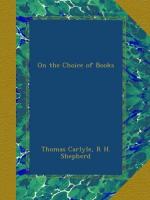Thomas Carlyle was born on Tuesday, December 4th, 1795, at Ecclefechan, a small village in the district of Annandale, Dumfriesshire. His father, a stone-mason, was noted for quickness of mental perception, and great energy and decision of character; his mother, as affectionate, pious, and more than ordinarily intelligent;[A] and thus accepting his own theory, that “the history of a man’s childhood is the description of his parents’ environment,” Carlyle entered upon the “mystery of life” under happy and enviable circumstances. After preliminary instruction, first at the parish school, and afterwards at Annan, he went, in November, 1809, and when he was fourteen years old, to the University of Edinburgh. Here he remained till the summer of 1814, distinguishing himself by his devotion to mathematical studies then taught there by Professor Leslie. As a student, he was irregular in his application, but when he did set to work, it was with his whole energy. He appears to have been a great reader of general literature at this time, and the stories that are told of the books that he got through are scarcely to be credited. In the summer of 1814, on the resignation of Mr. Waugh, Carlyle obtained, by competitive examination at Dumfries, the post of mathematical master at Annan Academy. Although he had, at his parents’ desire, commenced his studies with a view to entering the Scottish Church, the idea of becoming a minister was growingly distasteful to him. A fellow-student describes his habits at this time as lonely and contemplative; and we know from another source that his vacations were principally spent among the hills and by the rivers of his native county. In the summer of 1816 he was promoted to the post of “classical and mathematical master” at the old Burgh or Grammar School at Kirkcaldy. At the new school in that town Edward Irving, whose acquaintance Carlyle first made at Edinburgh, about Christmas, 1815, had been established since the year 1812; they were thus brought closely together, and their intimacy soon ripened into a friendship destined to become famous. At Kirkcaldy Carlyle remained over two years, becoming more and more convinced that neither as minister nor as schoolmaster was he to successfully fight his way up in the world. It had become clear to him that literature was his true vocation, and he would have started in the profession at once, had it been convenient for him to do so.
[Footnote A: James Carlyle was born in August, 1758, and died January 23, 1832. His second wife (whose maiden name was Margaret Aitken), was born in September, 1771, and died on Christmas Day, 1853. There were nine children of this marriage, “whereof four sons and three daughters,” says the inscription en the tombstone in the burial-ground at Ecclefechan, “survived, gratefully reverent of such a father and such a mother.”]
He had already written several articles and essays, and a few of them had appeared in print; but they gave little promise or indication of the power he was afterwards to exhibit. During the years 1820—1823, he contributed a series of articles (biographical and topographical) to Brewster’s “Edinburgh Encyclopaedia,"[1] viz.:—




